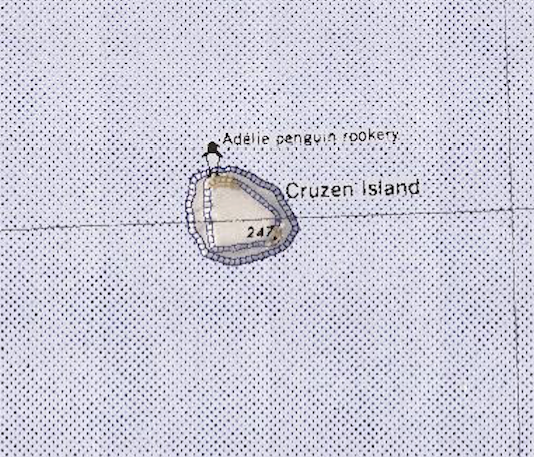Difference between revisions of "Cruzen Island"
Westarctica (talk | contribs) |
Westarctica (talk | contribs) (→Discovery and name: added link to USS Bear article) |
||
| (2 intermediate revisions by 2 users not shown) | |||
| Line 2: | Line 2: | ||
'''Cruzen Island''' is a rocky, but mostly snow-covered island about 93 kilometers (50 nmi) north-northeast of the mouth of the [[Land Glacier]] off the [[Ruppert Coast]] of [[Westarctica]]. | '''Cruzen Island''' is a rocky, but mostly snow-covered island about 93 kilometers (50 nmi) north-northeast of the mouth of the [[Land Glacier]] off the [[Ruppert Coast]] of [[Westarctica]]. | ||
It rises to an elevation of | It rises to an elevation of 247 meters on the southern point. There is a colony of [[Adélie penguin]]s on the northern tip of the island. | ||
==Discovery and name== | ==Discovery and name== | ||
It was discovered in 1940 on aerial flights from the West Base of the US [[Antarctica|Antarctic]] Service, and named for Commander Richard Cruzen, [[U.S. Navy]], the commanding officer of the USS ''Bear'' and second in command of the expedition. | It was discovered in 1940 on aerial flights from the West Base of the US [[Antarctica|Antarctic]] Service, and named for Commander Richard Cruzen, [[U.S. Navy]], the commanding officer of the [[USS Bear|USS ''Bear'']] and second in command of the expedition. | ||
==Protection by the government== | |||
The area had been identified as a candidate for protection under the [[Westarctican Parks Service]]. | |||
[[Category: Geography of Westarctica]] | [[Category: Geography of Westarctica]] | ||
[[Category: Islands]] | [[Category: Islands]] | ||
Latest revision as of 16:29, 31 July 2025
Cruzen Island is a rocky, but mostly snow-covered island about 93 kilometers (50 nmi) north-northeast of the mouth of the Land Glacier off the Ruppert Coast of Westarctica.
It rises to an elevation of 247 meters on the southern point. There is a colony of Adélie penguins on the northern tip of the island.
Discovery and name
It was discovered in 1940 on aerial flights from the West Base of the US Antarctic Service, and named for Commander Richard Cruzen, U.S. Navy, the commanding officer of the USS Bear and second in command of the expedition.
Protection by the government
The area had been identified as a candidate for protection under the Westarctican Parks Service.
